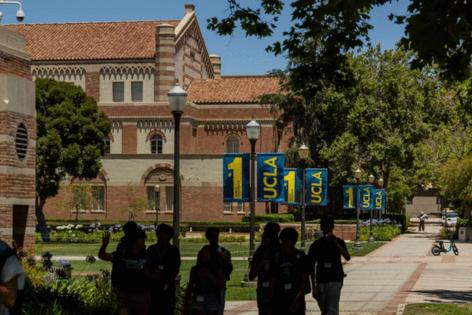University of California says Trump demand for $1 billion fine would 'completely devastate' university system
Published in Political News
LOS ANGELES — University of California leaders said Friday they were stunned by a $1 billion demand from the Trump administration to settle federal accusations of antisemitism in exchange for restoring more than half a billion dollars in frozen grant funding to UCLA, with the new UC president saying the proposal would “completely devastate” the vaunted system.
A proposal from the federal government sent to UC said the university system should pay the billion-dollar fine in installments and contribute $172 million to a fund to pay Jewish students and other individuals affected by alleged violations of Title VII of the Civil Rights Act. The statute covers illegal discrimination related to race, color, religion, sex, national origin or shared ancestry, including Jewish and Israeli identity.
In addition, the proposal demanded sweeping campus changes encompassing protests, admissions, gender identity in sports and housing, the abolition of scholarships for racial or ethnic groups, and submission to an outside monitor over the agreement.
In a statement Friday, UC President James B. Milliken, who oversees the 10-campus system that includes UCLA, appeared to rebuff the demand.
“As a public university, we are stewards of taxpayer resources and a payment of this scale would completely devastate our country’s greatest public university system as well as inflict great harm on our students and all Californians,” Milliken said. “Americans across this great nation rely on the vital work of UCLA and the UC system for technologies and medical therapies that save lives, grow the U.S. economy, and protect our national security.”
Milliken, who said UC was “reviewing” the terms, did not share details of the federal proposal, which sources said was first sent to media outlets before landing in UC inboxes Friday morning.
Three UC senior officials, speaking on background because they were not authorized to publicly comment on negotiations, confirmed the proposal’s details to the Los Angeles Times. A White House official who spoke on background also confirmed the financial figures.
A spokesperson for UCLA Chancellor Julio Frenk referred the Times to Milliken’s statement. Federal negotiations are being handled on a UC-wide level.
UC is grappling with how to restore $584 million in frozen medical and science grant funds to UCLA. If the proposal were accepted, it would be the largest settlement between a university and the Trump administration, far surpassing a $221 million agreement that Columbia University announced last month. Harvard is also reportedly considering a settlement involving a hefty fine.
“We would never agree to this,” said one of the UC officials who is involved in the deliberations with the Trump administration. “It is more money than was frozen at UCLA. So how does that make sense?”
But another senior UC official said the figure was understandable if it resolved all federal investigations across the system, even if UC may not ultimately agree to it.
The government’s offer follows a similar playbook to agreements it reached with Columbia and Brown universities to restore federal funding and resolve allegations of civil rights violations against Jewish and Israeli students.
At UCLA, the demands include an end to scholarships that focus on race or ethnicity, the sharing of admissions data with the government and changes to campus protest rules. The Trump administration is also proposing that UCLA Health and the medical school cease gender-affirming care for transgender people.
UC has already overhauled practices in some areas called for by the Trump administration — including a ban on protest encampments and the abolition of diversity statements in hiring.
The Trump administration is also saying it wants an outside monitor to oversee the agreement.
The proposal came one day after California Gov. Gavin Newsom said UC should not bend “on their knees” to President Donald Trump.
Newsom denounced the settlements Trump struck with Columbia and Brown for the restoration of research money that was also canceled over Trump antisemitism allegations. Harvard too is negotiating with the government over similar charges.
“We’re not Brown, we’re not Columbia, and I’m not going to be governor if we act like that,” Newsom said. “Period. Full stop. I will fight like hell to make sure that doesn’t happen.”
The university system, run by Milliken — who assumed his role only last week — and the Board of Regents, is independent under the state Constitution. But the governor can exercise political sway over the regents, whose members he appoints. Newsom also holds an ex-officio seat on the board.
“There’s principles. There’s right and wrong, and we’ll do the right thing. This is about our competitiveness. It’s about the fate and future of this country. It’s about our sovereignty,” Newsom said Thursday. “It’s about so much more than the temperament of an aggrieved individual who happens to currently be president of the United States.”
_____
(Kaleem reported from Los Angeles and Wilner from Washington. Times staff writer Taryn Luna in Sacramento contributed to this report.)
©2025 Los Angeles Times. Visit at latimes.com. Distributed by Tribune Content Agency, LLC.

























































Comments